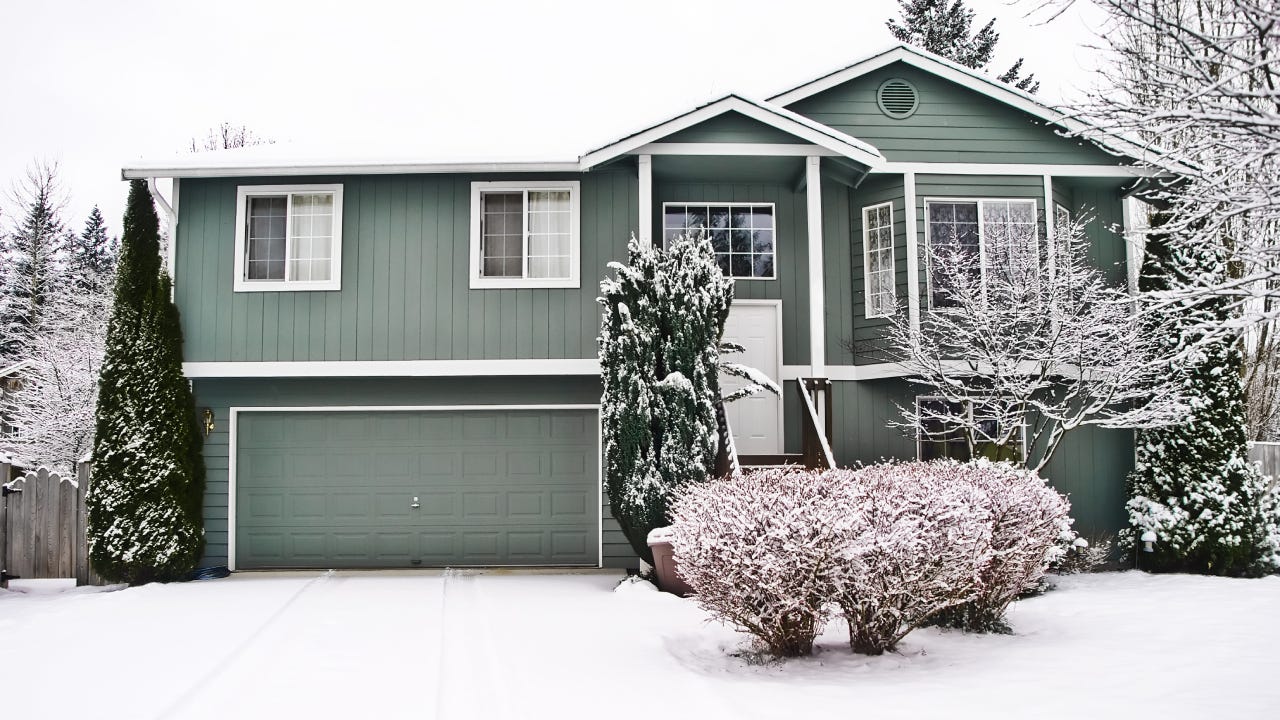Housing market predictions for winter 2023

Key takeaways
- Home prices and mortgage rates are both expected to remain high this winter, keeping the market challenging for buyers.
- The housing shortage may improve slightly, but overall the lack of inventory is expected to persist.
- Even so, experts say if you are financially prepared for a home purchase, don’t let the market conditions stop you.
The winter season often results in a retreat from real estate activity, with many buyers and sellers lying dormant until after the holidays are over and the weather has thawed. But there are still deals to be had by intrepid home shoppers, and opportunities for sellers to capitalize on motivated purchasers over the coming weeks.
Of course, it pays to do your homework before jumping into the chilly market this winter. Will mortgage rates drop by spring? Are there enough buyers out there to make listing your home worthwhile? Will the housing shortage improve anytime soon? For answers to these and other questions, we consulted with a few industry experts and asked for their winter housing market predictions.
Housing market stats and trends
Taking a closer look at the latest national real estate numbers paints an interesting picture.
- According to September data from the National Association of Realtors (NAR), existing-home sales declined more than 15 percent compared to the same period last year.
- At the same time, the country’s median home sale price keeps rising — September’s median of $394,300 marked the third consecutive month at the highest median NAR has ever recorded.
- And the amount of available housing inventory keeps falling, down more than 8 percent year-over-year.
- Meanwhile, on Thursday, October 19, Bankrate data showed mortgage interest rates hitting 8 percent for the first time since the year 2000.
“The housing market continues to be dragged down by high mortgage rates,” says Selma Hepp, chief economist for CoreLogic. “Since mortgage rates surged earlier this year, home sales activity has been trending along the lowest level since 2007. A combination of increased costs of homeownership and a lack of inventory is keeping potential home buyers on the sidelines.”
Dennis Shirshikov, head of content at real estate website Awning, equates the current market to an unpredictable seesaw. “We’ve got indicators like home prices, which have been high — skyrocketing because of pent-up demand from the pandemic era — but mortgage rates have been slowing down price growth and decelerating demand,” he says.
Home Qualified president Ralph DiBugnara, who is also a vice president at mortgage lender Cardinal Financial, agrees that current market conditions are surprising, making the future more difficult to predict. “This may be a different market than we have ever experienced in real estate,” says DiBugnara. “There is still a massive shortage nationally of homes available for sale, which is continuing to keep prices higher in most major markets. That, combined with high inflation, high interest rates and a continued strong demand to purchase, is a combination we have not dealt with in the past.”
Winter home prices to hold strong
Traditionally in winter, buyer interest wanes and many sellers wait to list until closer to spring, a trend that DiBugnara expects to continue. “But even a seasonal slowdown in the market won’t adjust prices significantly,” he says. “We could see a slight drop in the average home price, but I believe the inventory shortage will prevent any large trend toward downward prices. I anticipate home prices, on average, to remain flat over the next few months.”
Hepp notes that home prices have reached new highs in many markets. “But the recent surge in mortgage rates will likely lead to some small home price declines this winter,” she says. “Our CoreLogic forecast expects home price growth to accelerate slightly through the end of the year and then slow back down, averaging an increase of about 3.5 percent in 2024, with some stronger appreciation in markets that have seen home price resets — like California — and in more affordable markets in the Midwest and Southeast.”
Shirshikov expects declines in some especially strong markets this winter: “Prices will begin declining in particular markets that were overheating the last few years, such as Texas and Florida.”
Mortgage rates won’t drop much
Mortgage rates for the 30-year fixed-rate mortgage will likely average about 7.5 percent for the remainder of 2023, Hepp says. “Nevertheless, if supercore inflation continues to slow and the Fed does not raise rates again, we could see mortgage rates come down below 7 percent again this winter,” she adds.
DiBugnara echoes that 7.5 percent average rate prediction, and Bruce Ailion, a real estate attorney and broker with RE/MAX Town and Country in the Atlanta area, shares a similar opinion. “I expect rates will remain above 7 percent for the rest of the year,” he says. “Inflation has moderated but is still not at the 2 percent target level the Federal Reserve has established. Interest rates will continue to rise this winter until the 2 percent target level is reached and maintained for a while. I believe rates are likelier to reach 8 percent than 6 percent over the next 12 months.”
Inventory shortage will continue
Hepp believes inventory of existing homes for sale should increase a bit in 2024, as more sellers grow accustomed to higher mortgage rates and decide to list their homes anyway, due to changes in circumstances like a marriage, a divorce or a new job. “Also, given that over 40 percent of baby boomers own their homes free and clear, their decision to retire and move to other markets will help improve inventory levels in some markets — particularly the Northeast,” she says.
DiBugnara is less optimistic about supply numbers improving anytime soon. “Housing inventory is still at a huge deficit, and I don’t believe there is a quick fix, so it will stay mostly the same this winter,” he says.
Should you buy a home this winter?
Even though the market is far from buyer-friendly right now, your finances and life circumstances may matter more than market conditions. “If you are ready and able, you should start looking,” says Hepp. “Even with low inventories, it’s taking buyers longer now to find the right home. And with fewer buyers in the market, competition and bidding wars have waned.”
Ailion is a bit less bullish, saying the state of your local market should factor into your decision. “Waiting is the best option if you are in a market experiencing price declines,” he says. But “for buyers in a flat or increasing market, purchasing now is better than later.”
Buying a home is like timing a soufflé, says Shirshikov: “It has to be just right. In the current market, if you are ready and find the home of your dreams, I say go for it, because waiting might result in even higher mortgage rates and prices. Just be ready to act fast and have your finances in order. If mortgage rates go down, you can always refinance.”
Who bought houses in winter 2022?
Curious who is expected to purchase homes this winter? For clues, take a look at demographics tracked by the National Association of Realtors last year in their annual Home Buyers and Sellers Generational Trends Report.
| Homebuyer generation | % of 2022 buyers | Median age in group |
|---|---|---|
| Gen Z: 23 years and younger | 4 | 18 |
| Younger Gen Y/Millennials: 24-32 years | 12 | 29 |
| Older Gen Y/Millennials: 33-42 years | 16 | 38 |
| Gen X: 43-57 years | 24 | 50 |
| Younger Boomers: 58-67 years | 23 | 63 |
| Older Boomers: 68-76 years | 16 | 71 |
| Silent Generation: 77-97 years | 4 | 80 |
FAQs
-
Whether you should buy a home now or postpone the purchase depends on many factors, including the relative affordability of both the home itself and the mortgage loan. Some experts recommend waiting it out until things become more affordable. But there’s always the risk that, even if home prices decrease, mortgage rates will continue to rise in the coming months. If you are seeking to purchase but have a home to sell first, it may be in your best interest to delay your decision until rates come down.
-
Typically, the Federal Reserve will lower interest rates during a recession, which often results in lower mortgage rates and motivates people to spend money, stimulating the economy. However, with inflation still higher than desired, the trend has been to raise rates. You can likely expect lower prices on homes during a recession, but not necessarily decreased mortgage rates. If a recession were to occur, expect the belt-tightening to result in fewer buyers on the market as well.
-
Although a nationwide housing boom isn’t anticipated this winter, many areas still enjoy a relatively strong market. This typically translates to elevated prices, intensified competition among buyers, and an advantageous position for sellers. In such a competitive market, buyers should act swiftly and present their most compelling offers, which might involve a larger down payment or even a cash purchase if feasible. For sellers, the goal should be to attract multiple offers on their properties to optimize the selling price. Both buyers and sellers can benefit greatly from collaborating with a knowledgeable local real estate agent.
Why we ask for feedback Your feedback helps us improve our content and services. It takes less than a minute to complete.
Your responses are anonymous and will only be used for improving our website.






